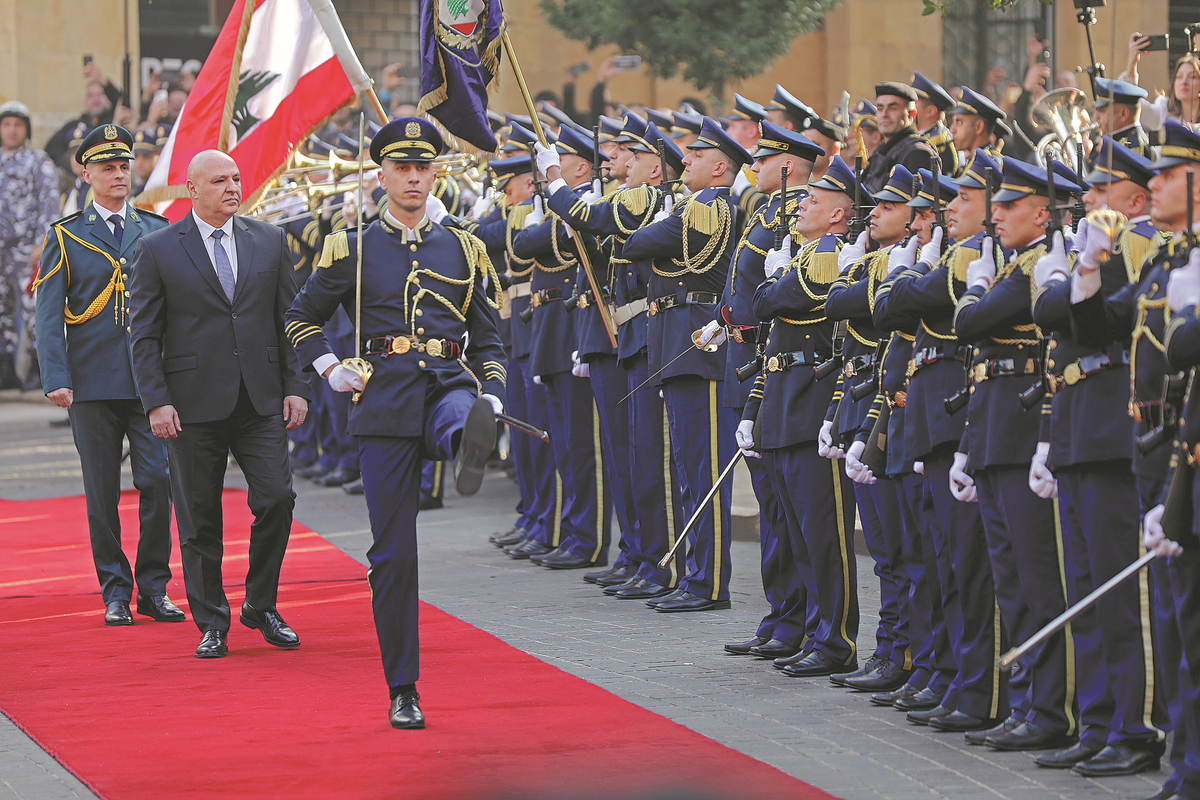
Joseph Aoun (second from left) reviews the guard of honor after he was sworn in as Lebanon's president in Beirut on Thursday. BILAL JAWICH/XINHUA
After many attempts, Lebanon has finally elected a president, ending more than two years of deadlock and raising hopes of a reset that could rid the nation of years of economic, political and security turmoil.
Joseph Aoun, who had been Lebanon's army commander, won huge backing at the end of an electoral session held by the 128-member Lebanese parliament on Thursday, weeks after Israel and Lebanon entered a 60-day cease-fire.
The political division had derailed Lebanon, leaving the country without a president following the end of the tenure of Michel Aoun — who is not related to the new head of state — in October 2022. A caretaker government led by Prime Minister Najib Mikati had been running the country during the presidential vacuum.
Leaders from Saudi Arabia, the United Arab Emirates, France, Iran and the United States were among those who congratulated Joseph Aoun. And Israel's foreign minister, Gideon Saar, said in a post on X that he congratulated Lebanon upon the election of a new president "following a lengthy political crisis".
China also congratulated Aoun on his election and expressed the readiness to promote the development of bilateral ties, according to Xinhua News Agency.
Chinese foreign ministry spokesman Guo Jiakun said that China and Lebanon enjoy a traditional friendship and China attaches great importance to developing bilateral ties.
Days before the election, the head of Hezbollah's Coordination and Liaison Unit, Wafiq Safa, said in a televised interview that the party would not "veto" the nomination of Aoun.
During his inaugural speech, Aoun acknowledged "the need for change in Lebanon's political system" and the "importance of legal and judicial reform", calling his election "the greatest medal" he could receive from the parliament.
Elie Al Hindy, an associate professor of international relations at the American University in the Emirates, in Dubai, told China Daily that in the general geopolitical sense, the presidential election in Lebanon is "a clear sign of the revival of political life, and of the start of Lebanon's recovery".
'New balance of power'
"The way the election happened and the choice of the person is a clear reflection of the new balance of power in the region and inside Lebanon," said Al Hindy, who is a former head of foreign affairs in the Lebanese Forces Party.
"The most important message of the new president is a monopoly of weapons in the hand of the State and implementing all international resolutions. (The) next test is the formation of a government that goes in the same direction," said Al Hindy.
Gokhan Batu, an analyst on Israel studies at the Center for Middle Eastern Studies in Turkiye, said Aoun's election marks "a significant development shaped by Hezbollah and Amal's calculated support". The Amal Movement is a prominent Shia political group in Lebanon.
"This backing is primarily explained by the pressing need for international assistance, which many external actors have explicitly tied to political stability and a functional government," said Batu.
Lebanese politics is based on a sectarian power-sharing structure. The positions of president, prime minister and parliament speaker must be split between a Maronite Christian, a Sunni Muslim and a Shia Muslim.
By facilitating Aoun's election, Batu said, Hezbollah seeks to mitigate further harm to its standing in Lebanese politics and ensure access to crucial aid, which is likely to benefit its constituencies and bolster its influence in the long term.
"The fragile cease-fire" with Israel, which term ends later this month, "is unlikely to result in substantial shifts unless external pressures or provocations emerge", he said. "For now, Hezbollah's priority seems to be maintaining internal equilibrium and securing international support."
In his speech, Aoun highlighted the need to rebuild following the damage caused by Israeli aggression in southern Lebanon and urged the country to focus on strengthening ties with the outside world, "rather than relying on foreign powers to gain an advantage over each other internally".
Batu said that for Aoun, the primary challenge ahead will be forming a functional government capable of managing the country's crises effectively.
"This includes the delicate task of handling cease-fire processes with Israel, a critical factor in preventing further escalation. Whether this dual challenge — domestic governance and regional stability — can be met will largely determine Lebanon's near-term trajectory and its ability to recover from ongoing economic and political turmoil," he added.
jan@chinadailyapac.com